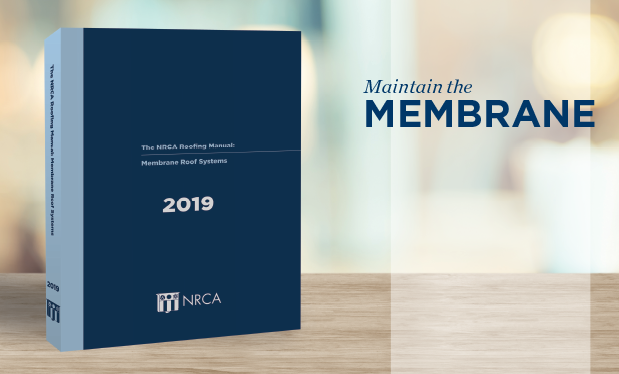Torch-applied polymer-modified bitumen sheet products have been used successfully and safely in North America since the late 1970s; however, in a limited number of situations, rooftop fires have occurred during the application of these products.
NRCA is of the opinion torch-applied polymer-modified bitumen sheet products can be used safely if roof decks, roof membranes and construction details are designed properly and installed with fire safety techniques taken into consideration. NRCA recommends designs be based on guidelines contained in The NRCA Roofing Manual and torch-applied applications should only be carried out by CERTA-trained workers.
The NRCA Roofing Manual
Torch-applied polymer-modified bitumen sheet products are addressed in The NRCA Roofing Manual: Membrane Roof Systems—2019. Specific assembly configurations for which NRCA recommends torch-applied products are described in Chapter 1-Roof Assembly Configurations. These include torch-applied roof systems over non-nailable (concrete) and insulated roof decks except combustible (wood) roof decks.
NRCA is particularly concerned about the potential for fire during the installation of torch-applied membrane sheets over combustible substrates, such as wood roof decks, wood panel sheathing, wood planks and boards, and wood blocking. As a result, in the 2019 volume, NRCA no longer recommends designers specify torch-applied polymer-modified bitumen sheet products over combustible roof decks even if a thermal-barrier insulation layer is installed over a combustible roof deck.
NRCA considers the potential fire risks associated with torch-applied applications over combustible roof decks to outweigh the advantages torch application provides. Also, alternative application methods for polymer-modified bitumen sheet products have proved to be successful. Designers should consider alternative application methods, such as cold adhesive application, when polymer-modified bitumen sheet products are specified over combustible roof decks.
NRCA's recommended guidelines for construction details using torch-applied polymer-modified bitumen sheet products are provided in the 2019 volume's Chapter 10-Construction Details. These are unchanged from the previous edition. Separate recommendations and construction details are provided for noncombustible substrates and combustible substrates.
Because compliance with The NRCA Roofing Manual is a specific provision of the CERTA program's best safety practices, NRCA's new recommended exclusion and the 2019 volume's Chapter 10 recommendations and construction details also apply to the CERTA program.
OIRCA bulletin
In December 2018, the Ontario Industrial Roofing Contractors Association (OIRCA) issued a bulletin, "OIRCA Submits Ontario Fire Code Changes to the Ontario Fire Marshal," detailing changes the group has proposed to Ontario's fire code.
Specifically, OIRCA has proposed open flame torches no longer be used to apply roofing materials at roof flashings and penetrations. OIRCA indicates most torch fires originate at roof flashings and penetrations; fewer start in the fields of roofs.
OIRCA also has proposed a hand-held thermal imaging camera be employed as a part of Ontario's code-required, two-hour fire watch.
OIRCA's bulletin indicates its board of directors strongly believes an aggressive position must be taken to reduce the potential for future fires when using torch-applied roofing products. Awareness of torching-related fires is spreading as municipal fire departments, provincial fire marshals and the insurance industry take notice. Rather than having these groups dictate the roofing industry's future, OIRCA is seeking a better solution and believes its proposed changes to Ontario's fire code will do the job.
Closing thoughts
If you are involved in the manufacture, design or installation of torch-applied, polymer-modified bitumen sheet products, you should be aware of NRCA's new recommended exclusion of torching over wood roof decks and its applicability to the CERTA program.
Although NRCA and the CERTA program have not adopted OIRCA's proposed fire code changes, NRCA applauds OIRCA's efforts. Furthermore, NRCA agrees the roofing industry, not outside entities, should control its future.
NRCA's recommendations regarding the use of polymer-modified bitumen sheet products are provided in The NRCA Roofing Manual: Membrane Roof Systems—2019 (for more information about the 2019 volume, see "Maintain the membrane").
Additional information about the CERTA program is accessible at www.certa.org.
Mark S. Graham is NRCA's vice
president of technical services.
@MarkGrahamNRCA
This column is part of Research + Tech. Click here to read additional stories from this section.



